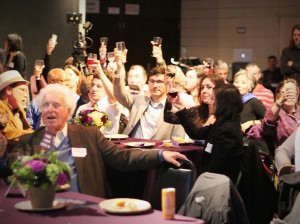After last week’s 12th Annual Human Rights Awards event – our hearts are full and our determination for radical change and real democracy revitalized.
May 8th was a night to remember! Please find photos from the event on our Facebook page.
We had a great time with everyone who came to the Palace of Fine Arts, and we’re grateful for the support of our donors, sponsors, and volunteers. Together, we helped shine a spotlight on the work of our amazing 2014 honorees: the Freedom Schools, María Estela Barco Huerta, and the Cuban Five.
A big thanks to the evening’s human rights heroes and our special guest, Aisha Fukushima, who moved the audience with her heartfelt spoken word and song performance.
Accepting the award for the Cuban Five was María Eugenia Guerrero Rodriguez, the sister of Antonio Guerrero. The Global Exchange People’s Choice Award marks the first time these men have received recognition in the U.S., and the first time a family member of the Cuban 5 has spoken publicly in the U.S. on their behalf. Prior to the event, they sent letters to Global Exchange. See María Eugenia Guerrero Rodriguez’s speech on our Vimeo page.
Sharing her story of struggle and success working to protect the rights of indigenous communities in Chiapas, Mexico, International Honoree María Estela Barco Huerta, moved the audience with her words as she made a passionate call for us all to protect Mother Nature and to be defenders of human rights and dignity. See María Estela Barco Huerta’s speech on our Vimeo page.
Freedom Schools visionary Charlie Cobb and Dream Defenders Executive Director Phillip Agnew both took the stage to accept the Domestic Award for the Freedom Schools. Both channeled the power of history in honoring the struggle for civil rights and demanded that while we commemorate this history, we must recognize that there is still work to be done. See Phillip Agnew and Charlie Cobb’s speech on our Vimeo page.
We took the spirit of these speeches, and rounded out the evening in song with all attendees joining hand-in-hand to sing “We Shall Overcome.”
Bernice Johnson Reagon, legendary songwriter, singer and civil rights advocate, unfortunately was not able to join us on Thursday but sent in remarks.
Besides the inspiring speeches and music, the evening included a silent auction, delicious locally sourced food, wine from Frey Vineyards, and a Ben & Jerry’s ice cream buffet.
We thank all those, once again, who helped make this event a success. Our work would not be possible without the dedicated support of our members and donors. Not yet a member, or inspired to make an additional gift? – click here to donate today.




